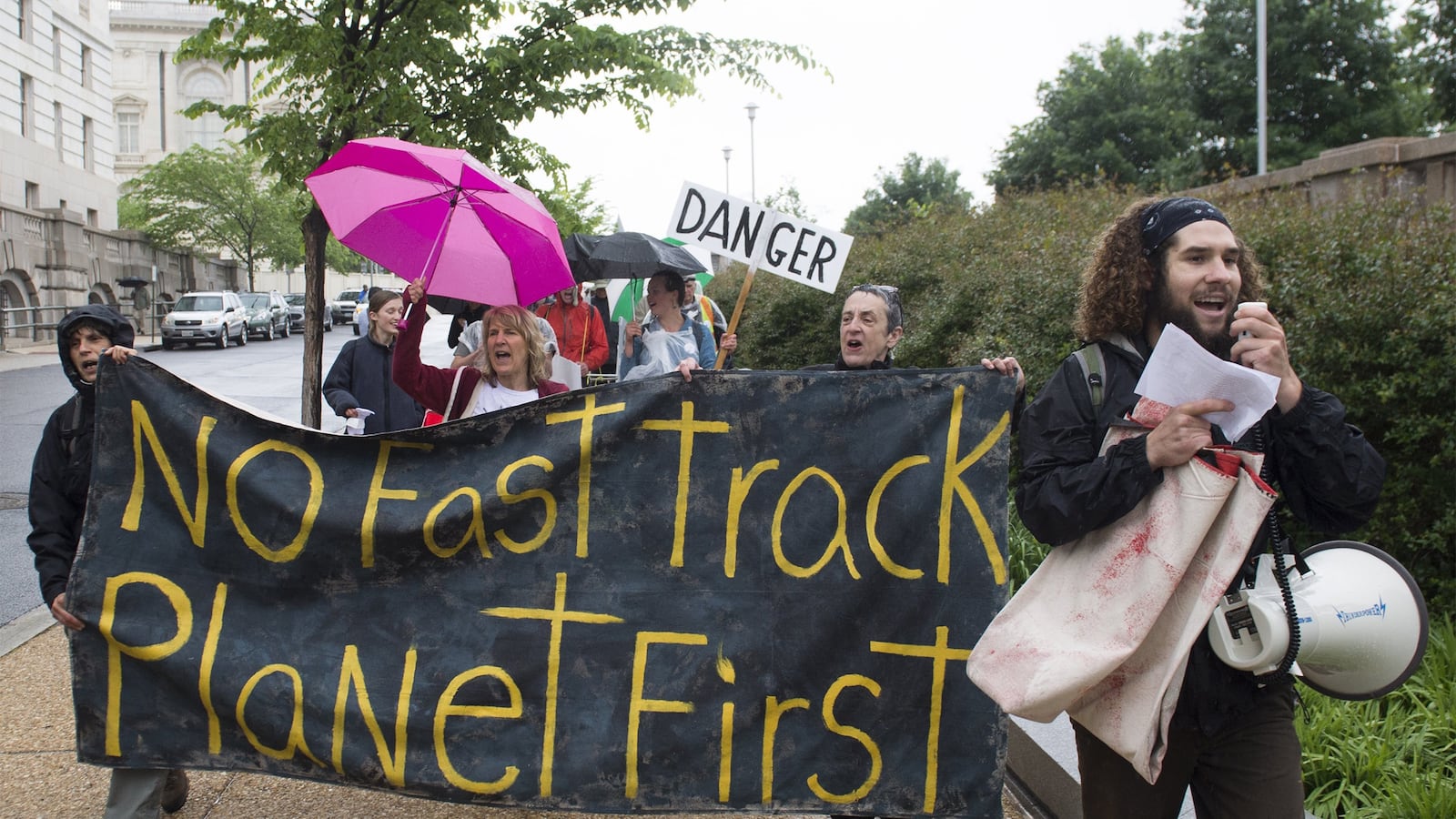President Obama won a major bipartisan victory in the Senate on Tuesday on trade promotion authority, clearing the way for approval in 2016 of the largest trade agreement in world history. But Obama has a problem: He won with the help of only 13 of the Senate’s 44 Democrats. House Democrats are even more annoyed with their president, who has leaned into trade legislation more aggressively than he has other parts of his economic agenda.
Those Democrats badly miscalculated this month. As Democratic Representative Gerald E. Connolly put it, their tactical vote to kill one of the party’s priorities—trade adjustment assistance (TAA), an important progressive program to help laid-off workers get retrained at community colleges—was like the sheriff in Mel Brooks’ Blazing Saddles putting a gun to his head and holding himself hostage.
Having lost what they mistakenly thought was their leverage, Democrats will now reverse themselves and vote this week for TAA, a program they think doesn’t do nearly enough to protect workers from the harsh winds of global trade but is still better than nothing at all. And to make matters worse, they’ll need the Republican congressional leadership to help them keep it.
This week’s bill signing will hardly end the trade debate. The Trans-Pacific Partnership (TPP) deal itself won’t be finalized until this fall and submitted for ratification until early next year—just in time for the first presidential primaries. Hillary Clinton will have to keep bobbing and weaving on trade all the way to the 2016 general election.
In the meantime, Obama needs to figure out how to repair the rift in the Democratic Party and show the country that he can deliver something big for working people who don’t see much for themselves in trade deals. White House officials tell me they are working hard to fund a big infrastructure bill, but they are doing so amid a new oppositional liberal climate.
The latest trouble began when large numbers of liberal Democrats started acting like the Tea Party Republicans who broke from the leadership of their party to oppose the trade deal. From the anti-establishment base of both parties came an understandable but ultimately irrational cry of defiance, like King Canute raising his arms to stop the global tides from rolling in.
That bipartisan resistance to reason—whether genuine or political—is problematic in the 21st century. Labor on the left and Tea Party isolationists on the right have made trade deals a scapegoat for the often-harsh consequences of globalization. But the global economy is not a threat; it’s a fact. Our challenge isn’t to stand athwart history yelling “stop”; it’s to nudge it and shape it for the long-term interests of the country as a whole.
Like Obamacare and any other landmark legislation, TPP has winners and losers, but the winners aren’t just pharmaceutical companies and other big corporations. Sharp reduction or elimination of tariffs and other barriers in Asia will, on balance, help American workers. For instance, removing Vietnam’s 80 percent tariff on U.S. autos will almost certainly mean jobs for Detroit autoworkers over the next decade, and there’s a big boost in TPP for the U.S.’s job-creating heavy-equipment manufacturers (John Deere tractors are popular everywhere but often too expensive to buy with all the tariffs). The U.S. has major competitive advantages in services and IT that will be enhanced by the deal. And all of our new mom-and-pop online businesses will get a chance to export more, creating jobs.
The Obama administration made a big mistake in not letting the details circulate more widely. Secrecy breeds suspicion. It didn’t help that the news media and social media are largely bored by global trade, which means that vested interests are often the only voices. And the current deal has shortcomings, especially in the enforcement provisions. As Senator Elizabeth Warren points out, the investor-state dispute settlement (ISDS) process makes it easy for corporations to bring claims against governments, but difficult for unions and environmentalists to do so. This needs to be fixed at the bargaining table over the next couple of months.
But whatever the deal’s shortcomings, it is clearly advantageous to the U.S. to set the trade rules for 38 percent of the global economy. The alternative is to let China (not a party to the TPP) cut its own preferential deals with its neighbors, which would be terrible for Asian workers, the environment and U.S. strategic interests. Even with the enforcement problems, the deal is a big win for the international environmental and labor standards that, well, environmentalists and labor leaders have been arguing for since the 1970s.
Michael Froman, the U.S. Trade Representative, tells me that on everything from intellectual property to Internet freedom to bans on expropriation, “we’ve taken U.S. law as our starting point in these negotiations.” Froman, a friend of Obama from their Harvard Law School days, has received a chilly reception from many congressional Democrats who are mindlessly leery of his background at Citibank. They should listen more to his logic, which suggests that it’s not in our interests to set off a competition for which nations can have the fewest environmental and labor regulations and the lowest wages: “We’re fighting to see a race to the top in the global economy, not a race to the bottom that we can’t win and shouldn’t even try to run.”
Of course the debate is not really about a logical assessment of the advantages and disadvantages of TPP. It’s about the financial and emotional body blows inflicted on organized labor and middle-class Americans in recent decades—blows that Obama understands abstractly but has not countered with sustained legislative efforts. His many speeches about jobs and infrastructure—the same thing, since construction jobs can’t be outsourced—have been necessary but hardly sufficient.
So far, Obama hasn’t played good poker on his economic agenda. He should have recognized that the Republicans needed a trade deal to show the country they could get something positive done, then linked TPP to a jobs program.
Fortunately there’s still time for the president to put his nose to the grindstone on jobs in the same way he has with trade. With the highway trust fund and tax reform both on the table, Obama should devote the rest of 2015 on the domestic side to finding the money for infrastructure. Unlike immigration reform or gun safety, this is achievable with Republicans.
Few Republicans recall that the GOP was founded in the 1850s on what were then known as “internal improvements” as well as opposition to slavery in the territories. But many seem ready for creative policy-making on the issue. Representative Barbara Comstock and other influential conservatives I’ve spoken with are open to a big transportation bill if a way can be found to pay for it other than an increase in the gas tax.
The best solution (after a gas tax hike) lies in repatriated earnings. As Democratic Representative Dan Kildee explains: If American companies that have fled overseas were taxed at a low rate (well below the capital gains rate) on their repatriated earnings, the receipts would fund as much as $500 billion in infrastructure investment. Matched by the private sector (quite likely, actually), about $1 trillion would be available over 10 years for rebuilding the roads, bridges, tunnels, airports, rails and sewage systems of the United States—enough (with the spinoff businesses) to offer jobs to millions of the unemployed and propel a whole generation of older displaced construction workers to retirement with some dignity. With interest rates still at historic lows, we have an historic opportunity to lock in huge projects that will quickly pay for themselves.
Republicans have other ideas for funding the transportation bill and establishing an infrastructure bank. Several have offered a deal involving offshore drilling rights. Or maybe it can be part of a Grand Bargain with Representative Paul Ryan on tax reform.
Whatever the solution, it should be sold not as stimulus—a dead-on-arrival argument with the Republican Congress—but as a matter of strength and competitiveness and national greatness. China spends 10 times as much on infrastructure as the U.S. as a percentage of its GDP. Do we really want China to have a better infrastructure than ours?
Of course “infrastructure” sounds like a snooze. Many Americans don’t even know what it means. So the domestic agenda of the end of the Obama era is better framed as simply: Rebuild America.
Thinking big this way is terribly out of fashion in cynical, polarized Washington. But both parties have an interest in using the bipartisanship of the trade agreement as a model for the huge infrastructure investments that can help rebuild this country. Republican members need to show the public that their congressional majority can keep working positively, as well as bring home long-overdue local projects to their constituents. Democratic members, frustrated by their loss on trade, need a big win for working people and for themselves. So does the president.
In fact, his legacy depends on it.





